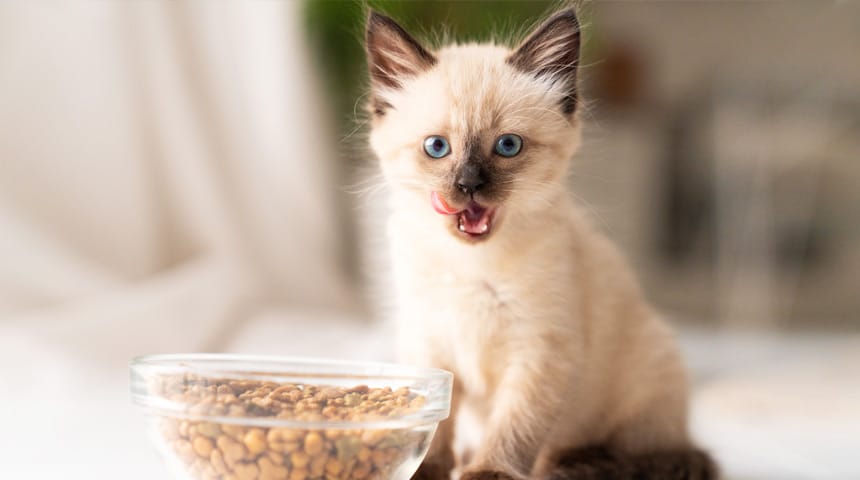
As soon as your kitten comes home, give her a healthy diet! This will improve your kitten’s health, development, appearance, and behaviour. The way you feed your kitten will also prevent her from gaining too much weight as she grows and reduce her risk of obesity as an adult. Excellent nutrition is the main component of wellness medicine, which aims to prevent health problems rather than treating them later in life.
Here are a few tips to help you start Kitty on the right paw.
Choose your kitten’s diet carefully
There is a lot of confusing information on the market about kitten food. The old saying that "you get what you pay for" is especially true for pet foods. We urge you not to compare foods based on the guaranteed analysis on the label. This data is solely based on chemical analysis and measures the gross amounts for each ingredient category - it doesn’t tell you anything about the quality and digestibility of the ingredients. If the kitten food is highly digestible, you will feed less of it. Typically, feeding your kitten should cost between $0.25 and $1.00 per day, depending on her age and whether it’s dry or canned food.
Make sure you feed your kitten food that has passed the American Association of Food Control Officials (AAFCO) growth tests.
Benefits of a premium diet
The diet we recommend is of outstanding quality. We expect your kitten will have a shiny, silky coat, be playful and lively, have healthy teeth and gums, and have small, well-formed stools. A premium diet will help your kitten develop strong bones, muscles and tissues, and build her immune system that will help her fight disease.
Feed your kitten according to her individual needs
Give your kitten small, frequent meals if possible, as she has a small stomach and high energy needs. You can leave small amounts of dry food around at all times and let her snack on it whenever she wants. Watch her weight and appearance. She should have a slender body and good body condition: you should be able to feel her ribs, but not see them. Adjustments in the amount of food left out may be necessary to prevent excess weight gain, especially between the ages of 4 and 9 months.
Avoid giving human food to your cat
If you determine from the beginning that your kitten will never eat table scraps or food that you eat, she will be less likely to beg and less likely to become overweight. It also reduces the chances of cats becoming difficult with their food. If you feel compelled to serve her "table food," it should be only small amounts of lean, cooked meat, and always in the cat’s food bowl. Never feed your kitten from the counter or table.
Giver her canned food
Although you may prefer to feed dry food, always give her some canned food (even if it’s only a tablespoon a day). Cats are very sensitive to the palatability of the food they eat. As they age, they sometimes develop certain medical conditions that can be better controlled by increasing their water intake. Canned food is the best way to do so. Cats that never ate canned food when they were young often refuse to eat it later in life, when it could be extremely beneficial to them.
Where to feed your kitten
Serve Kitty’s meals in a quiet place. This helps establish a routine, reduces excitement around meals, and helps reduce the likelihood of stomach issues. Make sure the area where she eats is not too close to the litter box, as this can interfere with litter box training.
Measure food and serve Kitty’s food in her own bowl
Always measure your kitten’s food so you can make adjustments if her body condition warrants it. If you have other cats at home, feed the kitten separately, in her own bowl. Kitten food is formulated specifically for growing kittens; you don’t want your adult cats eating the kitten food, and vice versa. Dry food can be moistened to make it more digestible for very young kittens.
Slowly transition any new food
If you are changing your kitten’s diet, mix the new food with the old food in small amounts on the first or second day. Then gradually increase the proportions of the new food over a period of 5 to 7 days. This will reduce the possibility of vomiting or diarrhea. Your kitten should have well-formed stools.
Milk
Cow’s milk is not recommended for small kittens. In fact, many kittens do not digest milk and get diarrhea. All your cat needs is fresh, clean water.
Treats
A growing number of us are offering treats to socialize, train and simply show our love to our little cats. Find out more about healthy, calorie-reliable treats for your kitten.

